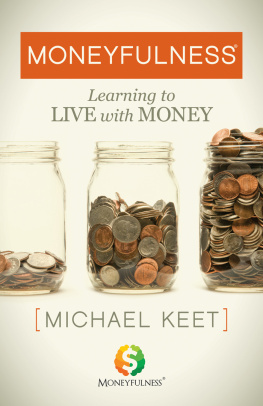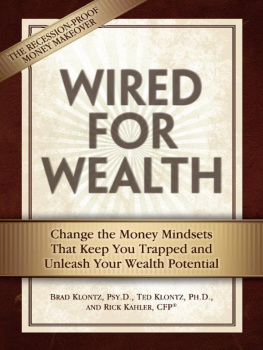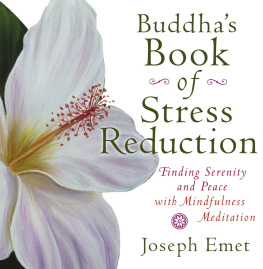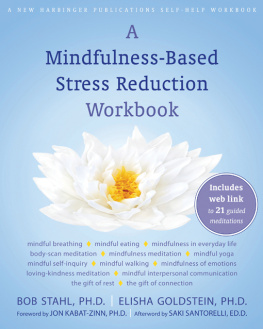MONEYFULNESS
MONEYFULNESS
Learning to
LIVE with MONEY
MICHAEL KEET

NEW YORK
LONDONNASHVILLEMELBOURNEVANCOUVER
MONEYFULNESS
Learning to LIVE with MONEY
2020 MICHAEL KEET
All rights reserved. No portion of this book may be reproduced, stored in a retrieval system, or transmitted in any form or by any meanselectronic, mechanical, photocopy, recording, scanning, or otherexcept for brief quotations in critical reviews or articles, without the prior written permission of the publisher.
Published in New York, New York, by Morgan James Publishing. Morgan James is a trademark of Morgan James, LLC. www.MorganJamesPublishing.com
ISBN 978-1-64279-616-2 paperback
ISBN 978-1-64279-617-9 eBook
Library of Congress Control Number: 2019907441
Cover Design by:
Rachel Lopez
www.r2cdesign.com
Interior Design by:
Bonnie Bushman
The Whole Caboodle Graphic Design

Morgan James is a proud partner of Habitat for Humanity Peninsula and Greater Williamsburg. Partners in building since 2006.
Get involved today! Visit
www.MorganJamesBuilds.com
To my wife because she had to listen to all my stories and doubts and ideas.
And because she wants to set up a Moneyfulness foundation with me.
When it comes to money, you cant win. If you focus on making it, youre materialistic. If you try to but dont make any, youre a loser. If you make a lot and keep it, youre a miser. If you make it and spend it, youre a spendthrift. If you dont care about making it, youre unambitious. If you make a lot and still have it when you die, youre a foolfor trying to take it with you. The only way to really win with money is to hold it looselyand be generous with it to accomplish things of value.
John C. Maxwell
INTRODUCTION
Money is the biggest cause of stress in America, hands down. For many of us, it can feel like, at the end of our money, there is still a lot of month left to get through. We struggle to get ahead and eagerly look forward to the next promotion, thinking a bigger paycheck will solve all our stress. Meanwhile, living without ever worrying about money feels like a far-off dream.
Yet, people who have more money still worry. Within the top 5% of the richest people on Earth, there are plenty who still have financial stress. Though they may have a significant amount in the bank at the beginning of the month, they worry about maintaining their wealth and making sure their high standard of living can be sustained or even passed down to future generations.
No matter your financial status, one thing is certain: we are all too stressed about money.
Stress appears if you have to do something or if something happens to you that is outside your comfort zone. It can either be a real challenge or an imagined challenge. Regardless if its real or imagined, it feels like a threat to your well-being, like you are in danger. This feeling flushes your body with hormones to prepare your system to evade or confront danger. According to the American Psychological Association (APA), there are three types of stress: acute, episodic acute and chronic stress.
Acute stress is the kind of stress that can appear any time of the day. Suddenly, its there. Lets say you have a presentation to give. You enter the room and start the laptop and beamer. Suddenly, you realize youve left your USB stick with the PowerPoint presentation at the office. In half an hour, 50 people will be staring at you. Your heart beats rapidly, your blood pressure rises, you start to sweat, your breath is short and frequent, and your hands and feet get cold. After five terrible minutes, youve found the solution. You call the office and ask them to email the PowerPoint to the host of the meeting He will copy it to his USB stick; the problem is solved. Ten minutes later, the PowerPoint presentation is running. You still have fifteen minutes to prepare yourself. Your acute stress has ended. As you can see, everybody will experience acute stress in their lives, no exception.
If youre frequently experiencing acute stress, if there are so many triggers that cause you acute stress, then normal acute stress turns into episodic acute stress. People living their life in episodic acute stress constantly feel overloaded. They have too many responsibilities, can hardly stay organized, and may experience burnout. People experiencing episodic acute stress may react with hostility or with a sense of dread, seeing only negative outcomes in their future.
Finally, chronic stress is the most harmful stress type. If youre constantly experiencing stress and theres hardly any moment in a day that youre stress free, it can damage your physical health and deteriorate your mental health. When it comes to money, we all experience some moments of acute stress, and maybe even a few periods of episodic acute stress. But if we live every day in a state of chronic financial stress, we will harm our general wellbeing (and likely wont improve our financial situation much, either).
Mindfulness
Mindfulness is a generally known concept today. In short, mindfulness helps you reach a state of inner peace, deal with stress and fears, reduce worrying, and avoid judging others. It teaches us to combat the stressors of our lives and work through them. There are hundreds of books and websites dedicated to the topic of mindfulness, especially as it relates to work and relationshipstwo huge areas of stress for most of us. In teaching us to be mindful in our careers and relationships, mindfulness experts rely on the seven aiding factors of mindfulness, or the primary pillars of a mindfulness practice.
The Seven Aiding Factors of Mindfulness
For those who are less familiar with mindfulness, Jon Kabat-Zinn, a mindfulness professor at the clinic of the university of Worcester, Massachusetts, USA, and founder of the stress reduction clinic, invented the seven aiding factors of mindfulness. They are:
- Not judging : Dont judge others. Try to observe without judgment. It helps you see what goes on inside your head. Be aware of your own prejudice. The trick is to refrain from acting on your prejudice. What happens in your head, stays in your head.
- Not striving : There is no other goal than to be yourself, in any form.
- Acceptance: The willingness to see things as they are. By accepting every moment completely as it is, you will be able to experience life more completely.
- Letting go : You have thoughts, ideas, wishes, opinions, hopes, experiences, etc. These can be pleasant, or unpleasant. Stop resisting and stop struggling to achieve it and let things be as they are.
- Beginners mind : Let go of all your past and start fresh. Be open to all new things and allow yourself to be surprised.
- Patience : Things happen when the time is right. Dont be frustrated because something doesnt work the way you want it to. Be patient. In time, all pieces will fall into place.
- Trust : Trust yourself and your feelings. Be confident that things will present themselves when the time is right. Rely on yourself and trust yourself.
I can imagine that, based on these seven aiding factors, you might think, This is very vague and woolly. The aiding factors are, in fact, formulated very generally. Being somewhat vague, they give us a framework to apply to most decisions and challenges we face in a given day. But theres something missing here.
Money: The Missing Element
Money is the main cause of stress in the United States. Yet, within the existing concept of mindfulness there hardly is any focus on money. Since the combination of mindfulness and money did not yet exist, I developed the concept of Moneyfulness to address the issue. Moneyfulness is made up of two distinct parts. First, a foundation of mindfulness is needed to change the way we think about money. Then, we need to learn practical skills for managing our money and changing our behaviors.











